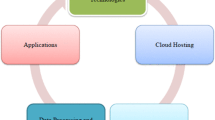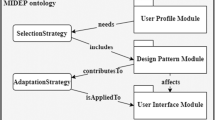Abstract
Context-aware computing is the ability of Services and applications to adapt and react to context changes. Context modelling is a core feature of context-aware computing. Although a lot of research has been made in the field of context modelling, most of the context-aware computing proposals prefer to design their own customized context model instead of reusing an existing one. The main reason for this behaviour is that current context models present some problems concerning reusability, extensibility and adaptation. To contribute solving these issues, in this paper we present 3LConOnt, a three-level context ontology that can be easily reused, extended and adapted for specific or generic purposes. The proposed context model consolidates the context knowledge already available from a modular perspective yielding a clear schema of knowledge reutilization. To do so, we gathered context knowledge pieces from different ontologies to be integrated into standardized and well-defined levels of abstraction and modules. The proposal has been validated considering: (1) reusability, extensibility and adaptation by instantiating different smart scenarios; (2) consistency and reasoning by triggering queries to the proposed model based on some competence questions; and (3) reusability in existing ontologies by importing the needed module or level of the model. Additionally, we also illustrate its usability in context-aware Services by modelling a context-aware framework architecture for supporting the whole context life cycle: acquisition, modelling, reasoning and distribution.





























Similar content being viewed by others
Notes
The 64 references corresponding to the selected ontologies can be found at [10].
Although Pinto and Martins use different criteria for evaluation, we find more natural to base the selection on the analysis previously made.
Pellet is an OWL-reasoner written in Java and provided as open-source software supporting SWRL language to describe first order query rules [50].
References
Abowd, G., Dey, A., Brown, P., Davies, N., Smith, M., Steggles, P.: Towards a better understanding of context and context-awareness. In: 1st International Symposium on Handheld and Ubiquitous Computing, pp. 304–307. Springer (1999)
Badidi, E., Taleb, I.: Towards a cloud-based framework for context management. In: 7th International Conference on Innovations in Information Technology, pp. 35–40. IEEE (2011)
Bazire, M., Brézillon, P.: Understanding context before using it. In: 5th International and Interdisciplinary Conference on Modeling and Using Context, pp. 29–40. Springer (2005)
Bettini, C., Brdiczka, O., Henricksen, K., Indulska, J., Nicklas, D., Ranganathan, A., Riboni, D.: A survey of context modelling and reasoning techniques. Pervasive Mob. Comput. 6(2), 161–180 (2010)
Bikakis, A., Patkos, T., Antoniou, G., Plexousakis, D.: A survey of semantics-based approaches for context reasoning in ambient intelligence. In: European Conference on Ambient Intelligence, pp. 14–23. Springer (2007)
Borst, W.N.: Construction of engineering ontologies for knowledge sharing and reuse. Ph.D. thesis, Universiteit Twente, Enschede (1997)
Brusa, G., Caliusco, L., Chiotti, O.: Towards ontological engineering: a process for building a domain ontology from scratch in public administration. Expert Syst. 25(5), 484–503 (2008)
Cabrera, O., Franch, X., Marco, J.: A context ontology for service provisioning and consumption. In: 8th International Conference on Research Challenges in Information Science, pp. 1–12. IEEE (2014)
Cabrera, O., Franch, X., Marco, J.: A middle-level ontology for context modelling. In: 34th International Conference on Conceptual Modeling, pp. 148–156. Springer (2015)
Cabrera, O., Franch, X., Marco, J.: Online annexes of 3LConOnt: A three-level ontology for context modelling in context-aware computing. http://gessi.lsi.upc.edu/threelevelcontextmodelling/ (2017). Accessed 03 Mar 2017
Cabrera, O., Franch, X., Marco, J.: Ontology-based context modeling in service-oriented computing: a systematic mapping. Data Knowl Eng 110, 24–53 (2017)
Cabrera, O., Oriol, M., Franch, X., Marco, J., López, L., Fragoso, O., Santaolaya, R.: Open framework for web service selection using multimodal and configurable techniques. Comput. Sist. 18(4), 665–682 (2014)
Cadenas, A., Ruiz, C., Larizgoitia, I., García-Castro, R., Lamsfus, C., Vázquez, I., González, M., Martín, D., Poveda, M.: Context management in mobile environments: a semantic approach. In: 1st Workshop on Context, Information and Ontologies, pp. 2:1–2:8. ACM (2009)
Cao, Y., Klamma, R., Hou, M., Jarke, M.: Follow me, follow you-spatiotemporal community context modeling and adaptation for mobile information systems. In: 9th International Conference on Mobile Data Management, pp. 108–115. IEEE (2008)
Chen, H., Finin, T., Joshi, A.: An ontology for context-aware pervasive computing environments. knowl. Eng. Rev. 18(3), 197–207 (2003)
Chen, H., Perich, F., Finin, T., Joshi, A.: Soupa: standard ontology for ubiquitous and pervasive applications. In: 1st International Conference on Mobile and Ubiquitous Systems: Networking and Services, pp. 258–267. IEEE (2004)
Corcho, O., Fernández-López, M., Gómez-Pérez, A.: Methodologies, tools and languages for building ontologies. Where is their meeting point? Data Knowl. Eng. 46(1), 41–64 (2003)
Coutaz, J., Crowley, J.L., Dobson, S., Garlan, D.: Context is key. Commun. ACM 48(3), 49–53 (2005)
Curtis, J., Cabral, J., Baxter, D.: On the application of the cyc ontology to word sense disambiguation. In: 19th International Florida Artificial Intelligence Research Society Conference, pp. 652–657. AAAI Press (2006)
De Nicola, A., Missikoff, M., Navigli, R.: A software engineering approach to ontology building. Inf. Syst. 34(2), 258–275 (2009)
Dey, A.: Understanding and using context. Pers. Ubiquit. Comput. 5(1), 4–7 (2001)
Dey, A., Abowd, G., Salber, D.: A conceptual framework and a toolkit for supporting the rapid prototyping of context-aware applications. Hum. Comput. Interact. 16(2), 97–166 (2001)
Fernández-López, M., Gómez-Pérez, A., Juristo, N.: Methontology: from ontological art towards ontological engineering. In: Ontological Engineering AAAI Spring Symposium Series, pp. 33–40. American Association for Artificial Intelligence (1997)
Gruber, T.: A translation approach to portable ontology specifications. Knowl. Acquis. 5(2), 199–220 (1993)
Grüninger, M., Fox, M.: Methodology for the design and evaluation of ontologies. In: 5th IJCAI Workshop on Basic Ontological Issues in Knowledge Sharing, pp. 14–24. IJCAI Inc. (1995)
Gu, T., Pung, H.K., Zhang, D.Q.: A service-oriented middleware for building context-aware services. Netw. Comput. Appl. 28(1), 1–18 (2005)
Gu, T., Wang, X., Pung, H., Zhang, D.Q.: An ontology-based context model in intelligent environments. In: Communication Networks and Distributed Systems Modeling and Simulation Conference, pp. 270–275 (2004)
Guarino, N.: Formal ontology and information systems. In: 1st International Conference on Formal Ontology in Information Systems, pp. 81–97. ACM (1998)
Hella, L., Krogstie, J.: A structured evaluation to assess the reusability of models of user profiles. In: Enterprise, Business-Process and Information Systems Modeling, pp. 220–233. Springer (2010)
Henricksen, K.: A framework for context-aware pervasive computing applications. Ph.D. thesis, University of Queensland, Brisbane (2003)
Hong, Jy, Suh, Eh, Kim, S.J.: Context-aware systems: a literature review and classification. Expert Syst. Appl. 36(4), 8509–8522 (2009)
Hu, B., Moore, P., Chen, H.H.: A semantic context model for location-based cooperative mobile computing. In: 13th International Conference on Communications, pp. 326–331. IEEE (2007)
Ji, Q., Haase, P., Qi, G., Hitzler, P., Stadtmüller, S.: RaDON—Repair and Diagnosis in Ontology Networks. Springer, Berlin (2009)
Kayes, A., Han, J., Colman, A.: Ontcaac: an ontology-based approach to context-aware access control for software services. Comput. J. 58(11), 3000–3034 (2015)
Kayes, A., Han, J., Colman, A.: An ontological framework for situation-aware access control of software services. Inf. Syst. 53, 253–277 (2015)
Kim, E., Choi, J.: An ontology-based context model in a smart home. In: 6th International Conference on Computational Science and Its Applications, pp. 11–20. Springer (2006)
Kishore, R., Sharman, R.: Computational ontologies and information systems I: foundations. Commun. Assoc. Inf. Syst. 14(1), 158–183 (2004)
Kofod-Petersen, A., Aamodt, A.: Contextualised Ambient Intelligence Through Case-Based Reasoning. Springer, Berlin (2006)
Li, M.: Ontology-based context information modeling for smart space. In: 10th International Conference on Cognitive Informatics & Cognitive Computing, pp. 278–283. IEEE (2011)
Miller, G.: Wordnet: a lexical database for english. Commun. ACM 38(11), 39–41 (1995)
Niles, I., Pease, A.: Towards a standard upper ontology. In: 2nd International Conference on Formal Ontology in Information Systems, pp. 2–9. ACM (2001)
Noy, N.: Semantic integration: a survey of ontology-based approaches. ACM Sigmod Rec. 33(4), 65–70 (2004)
Paganelli, F., Giuli, D.: An ontology-based context model for home health monitoring and alerting in chronic patient care networks. In: 21st International Conference on Advanced Information Networking and Applications Workshops, pp. 838–845. IEEE (2007)
Perera, C., Zaslavsky, A., Christen, P., Georgakopoulos, D.: Context aware computing for the internet of things: a survey. IEEE Commun. Surv. Tutor. 16(1), 414–454 (2014)
Pinto, S., Gómez-Pérez, A., Martins, J.P.: Some issues on ontology integration. In: 16th IJCAI workshop on Ontologies and Problem-Solving Methods, pp. 1–12. IJCAI Inc. (1999)
Pinto, S., Martins, J.P.: A methodology for ontology integration. In: 1st International Conference on Knowledge Capture, pp. 131–138. ACM (2001)
Prekop, P., Burnett, M.: Activities, context and ubiquitous computing. Comput. Commun. 26(11), 1168–1176 (2003)
Schilit, B., Adams, N., Want, R.: Context-aware computing applications. In: 1st Workshop on Mobile Computing Systems and Applications, pp. 85–90. IEEE (1994)
Schmidt, A.: Context-aware computing: context-awareness, context-aware user interfaces, and implicit interaction. In: Soegaard, M., Dam, RF. (eds.) The Encyclopedia of Human-Computer Interaction, 2nd edn., Aarhus, Denmark, The Interaction Design Foundation
Sirin, E., Parsia, B., Grau, B.C., Kalyanpur, A., Katz, Y.: Pellet: a practical owl-dl reasoner. Web Semant. Sci. Serv. Agents World Wide Web 5(2), 51–53 (2007)
Strang, T., Linnhoff-Popien, C.: A context modeling survey. In: 1st International Workshop on Advanced Context Modelling, Reasoning And Management at UbiComp, pp. 1–8. University of Southhampton (2004)
Strimpakou, M., Roussaki, I., Anagnostou, M.: A context ontology for pervasive service provision. In: 20th International Conference on Advanced Information Networking and Applications, pp. 775–779. IEEE (2006)
Stuckenschmidt, H., Parent, C., Spaccapietra, S.: Modular ontologies: concepts, theories and techniques for knowledge modularization. Springer, Lecture Notes in Computer Science (2009)
Su, X., Ilebrekke, L.: A comparative study of ontology languages and tools. In: 14th International Conference on Advanced Information Systems Engineering, pp. 761–765. Springer (2002)
Sudhana, K.M., Raj, C., Suresh, R.: An ontology-based framework for context-aware adaptive e-learning system. In: International Conference on Computer Communication and Informatics, pp. 1–6. IEEE (2013)
Uschold, M., King, M.: Towards a methodology for building ontologies. In: 5th IJCAI Workshop on Basic Ontological Issues in Knowledge Sharing, pp. 1–13. IJCAI Inc. (1995)
Wang, H., Zhang, Q., Gu, T., Pung, H.K.: Ontology based context modeling and reasoning using owl. In: 2nd Conference on Pervasive Computing and Communications Workshops, pp. 18–22. IEEE (2004)
Xiong, Z., Dixit, V., Waller, T.: The development of an ontology for driving context modelling and reasoning. In: 19th International Conference on Intelligent Transportation Systems, pp. 13–18. IEEE (2016)
Xynogalas, S., Roussaki, I., Chantzara, M., Anagnostou, M.: Context management in virtual home environment systems. Circuits Syst. Comput. 13(02), 293–311 (2004)
Acknowledgements
This work is partially supported by the Spanish Project TIN2016-79269-R and the SUPERSEDE Project, funded by the European Union’s Information and Communication Technologies Programme (H2020) Under Grant Agreement No 644018.
Author information
Authors and Affiliations
Corresponding author
Additional information
Communicated by Prof. Dragan Milicev.
Rights and permissions
About this article
Cite this article
Cabrera, O., Franch, X. & Marco, J. 3LConOnt: a three-level ontology for context modelling in context-aware computing. Softw Syst Model 18, 1345–1378 (2019). https://doi.org/10.1007/s10270-017-0611-z
Received:
Revised:
Accepted:
Published:
Issue Date:
DOI: https://doi.org/10.1007/s10270-017-0611-z




